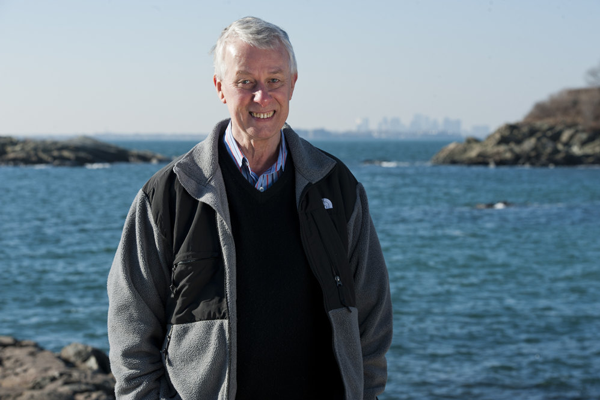Nobel laureate to join Northeastern faculty

Sir Richard Roberts, a Nobel laureate and globally recognized leader in genomics and molecular biology, has joined Northeastern University as a Distinguished University Professor in the College of Science.
Roberts received the Nobel Prize in 1993 for his discovery of split genes, sequences of DNA that contain both expressed and non-expressed material, research that profoundly changed the world’s understanding of animal life and started a revolution in molecular biology and genetic engineering. His appointment coincides with the relocation of the marine DNA repository Ocean Genome Legacy to Northeastern’s Marine Science Center in Nahant, Mass.
“Our oceans provide the next frontier in global scientific discovery,” said Joseph E. Aoun, president of Northeastern University. “Welcoming Sir Richard Roberts to our faculty, and the Ocean Genome Legacy to Northeastern, are instrumental in advancing our leadership in marine science and urban coastal research.”
OGL is a nonprofit environmental research organization dedicated to promoting new methods for the study and conservation of marine species through DNA preservation and analysis. Roberts is chief scientific officer at New England Biolabs, the genomics research company that established OGL. Founded by Donald Comb, a renowned molecular biologist who also serves as chairman of the board, New England Biolabs is a world leader in the discovery, development, and commercialization of recombinant and native enzymes for genomic research.
At its new home at Northeastern, OGL will be a resource to uncover some of our ocean’s deepest mysteries and reveal genomic information that can help cure diseases, protect the environment, and improve the sustainability of global food and energy supplies.
“The aim of OGL is to capture biological material from all marine species, and make it available for research to better the world,” said J. Murray Gibson, founding dean of the College of Science. “OGL is a centerpiece of our strategy for global experiential learning—students will travel the world to build the collection, and be involved in state-of-the art molecular biology learning from, and we hope helping to preserve, the wealth of biodiversity in the oceans.”
An international leader in genomics and molecular biology, Roberts’ contributions also include major advancements that led to the gene sequencing technologies the field relies on today. In the 1970s he realized that molecules called restriction enzymes, which cut DNA into smaller pieces, could make sequencing a more accessible possibility. He therefore shifted his focus to these molecules, leading the effort to discover three quarters of the world’s first restrictions enzymes. It was this work that led to his discovery of split genes.
“As marine species disappear, you also lose their DNA, which contains some extremely valuable information,” Roberts said. He noted that bringing OGL to Northeastern opens up new opportunities for students and faculty researchers alike. “Among Boston’s universities, Northeastern is clearly breaking new ground. I am very pleased to join the faculty and help accelerate its move into a leadership position.”
OGL’s move will facilitate collaborations between scientists at the Marine Science Center and investigators around the world, offering the opportunity to greatly expand the range of genomics evolution investigations possible for marine species.
Northeastern researchers have already begun to leverage the resource in their own investigations. Many have been contributing to the repository for several years. For example, William Detrich, professor of marine and environmental sciences, has deposited many Antarctic fish and invertebrate DNA samples into the collection, while Steven Vollmer, associate professor of marine and environmental sciences, and his students in Northeastern’s Three Seas Program are actively gathering samples from all of the Caribbean corals.
The OGL partnership and Roberts’ appointment both reflect Northeastern’s commitment to use-inspired approaches to problems in health, security, and sustainability.




